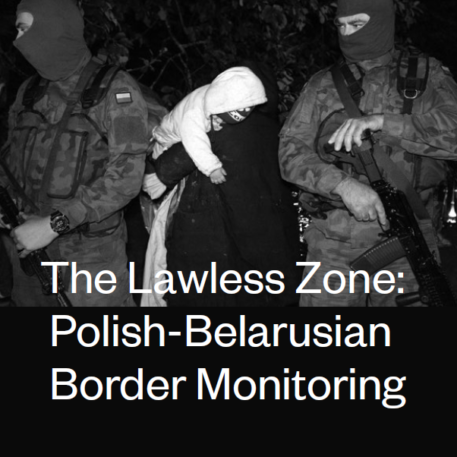
The Lawless Zone -12 months of the Polish-Belarusian border crisis
It has been one year since the Polish-Belarusian border crisis started. The HFHR releases an English version of the report “The Lawless Zone”, which covers the monitoring activities at the border from autumn 2021 to June 2022. The final part contains recommendations for Polish authorities and the EU.
In June 2022, the Helsinki Foundation for Human Rights released a Polish version of a report summarizing the crisis on the Polish-Belarusian border that had been ongoing since August 2021. Thanks to systematic monitoring and conducted interviews, the study presents not only the consequences of the unlawful policy of push-backs carried out by Polish armed forces towards people crossing the Polish-Belarusian border but also several recommendations for the Polish authorities and the European Union on how to resolve the crisis.
The authors of the report point out that the restriction of access to the border area for journalists and independent human rights and humanitarian aid organizations led to the creation of a zone that is, in a way, lawless. This zone is a place of numerous violations against both migrants and those who help them. The HFHR researchers focus on the increased violence and the progressive dehumanization of migrants by representatives of the security forces of both countries.
Push-backs are not legal
Despite the legislation adopted over the last year, which legalized pushing migrants back to the border with Belarus, such actions are inconsistent with both EU and international law. Regardless of the method of crossing the border, each person should be treated individually, which is possible only after initiating administrative proceedings. Meanwhile, as a result of the policy pursued by the Polish authorities, in many cases, Polish security forces ignore it when migrants declare their willingness to apply for international protection. The forces also didn’t attempt to identify any need for assistance for unaccompanied minors, persons with disabilities or victims of human trafficking, even though such assistance is required by law.
Evidence of Violence
Collective expulsions are carried out despite the well-documented violence experienced by migrants in Belarus, which is a violation of the principle of not returning foreigners to countries where they may be in danger (the principle of non-refoulement).
The report cites the stories of migrants who have experienced violence or inhuman and degrading treatment from Belarusian officials, which further proves that Belarus cannot be considered a safe state. Moreover, forcing the returnees to cross razor fences or rivers, often in extreme weather conditions and without access to humanitarian or medical aid, is a threat to their health or even life.
What about the inhabitants of the borderland?
The authors of the report also draw attention to violations of the rights of the border zone residents, especially those providing migrants in Polish forests with humanitarian aid. The authors emphasize that “the negative consequences of the government’s policy on the Polish-Belarusian border are also experienced by the inhabitants of the no-stay zone, especially those who bring help(…) After eleven months of the crisis, many of these people experience negative psychological effects of the situation, facing post-traumatic stress disorder or being so burdened with the need to provide humanitarian aid that their private, family or professional life suffers ”.
The report ends with recommendations, the implementation of which would bring the crisis to an end, help with de-escalation of violence and set a new course in Poland’s policy towards people seeking refuge from wars, persecution and violations of human rights, making Poland a safe country for both its inhabitants and people fleeing conflicts and dangers, currently condemned to wander the forests, and be subjected to violence and even death.
Read the full report


09.08.2022
 Cookies EN
Cookies EN